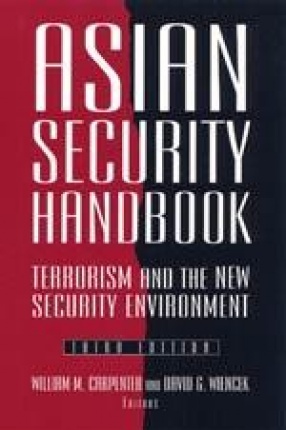This is the third edition of Asian Security Handbook. The previous volumes were published in 1996 and 2000. Because of the terrorist attacks of September 11, 2001, it is appropriate that we focus in this edition on the War on Terrorism and the still impact it is having in Asian. The introductory chapter outlines the new security environment brought about by the events of September 11 and provides a context for the country profile chapters that follow. The country-specific chapters provide wide-ranging coverage of the political-security situation in twenty-three individual nations and update our previous assessments. For this edition, new chapters on Bangladesh, Brunei, and Nepal have been added. The chapters presented here bring together the insights and expertise of our contributors, a diverse group of international security analysts and Asian affairs experts from government, academia, and the private sector. They bring significant experience, as well as a variety of perspectives, to the book. they have written sharply focused chapters that are designed to be analytical and interpretive. A short bibliographic list for further reading and reference appears at the end of each chapters. The analysis is designed to offer regional breadth with the intention of providing a handbook or primer that is relevant and accessible to a general audience, including students and training classes, the business and investment community, as well as specialists in Asian studies and international security affairs. Given such comprehensive coverage, this book will be a one-stop resource for those interested in geopolitical trends, terrorism and political risk, and defence and security issues in the Asia-Pacific region.
ABOUT THE AUTHOR David G. Wiencek
David G. Wiencek is President of International Security Group, a consulting company based near Washington, DC, that provides threat and risk analysis, global intelligence, and security-related research to international clients. Previously he served as Director of Research with Armor Group, an international security and risk management company in Washington, DC. Mr. Wiencek specializes in East and Southeast Asian political-security affairs, weapons of mass destruction and proliferation studies, terrorism assessment, kidnap-for-ransom issues, and corporate security matters. He holds BA and MA degrees in international affairs from American University, Washington, DC. He is coeditor with John C. Baker of Cooperative Monitoring in the South China Sea: Satellite Imagery, Confidence-Building Measures, and the Spratly Islands Disputes (Praeger Publishers,2002). His articles have appeared in the Washington Times, Jane's Intelligence Review, Defense News, the Journal of Counter terrorism and Homeland Security International, and other publications. Since 1996, Mr. Wiencek has participated as a panel speaker on a semiannual basis at the John F. Kennedy Special Warfare Center's Regional Studies Symposium at Fort Bragg, North Carolina.
ABOUT THE AUTHOR William M. Carpenter
William M. Carpenter is a consultant on international security affairs. Formerly Assistant Director of the Strategic Studies Center of SRI International, Arlington, Virginia, he is now President and Registered Agent of The American-Pacific Sealanes Security Institute, a research organization that conducts conferences in East Asian focusing on threats to the region's vital sea-lanes. A retired U.S. Navy captain, he served in command and staff assignments at sea and in Japan in three wars, and also in planning and policy offices in Washington, DC, before extending his career into the research field of international security studies with a specialty in East Asian affairs. He is a 1940graduate of the united States Naval Academy. His publications include The America That Can Say No, and America and Island China: A Documentary History with Stephen P. Gibert.





There are no reviews yet.